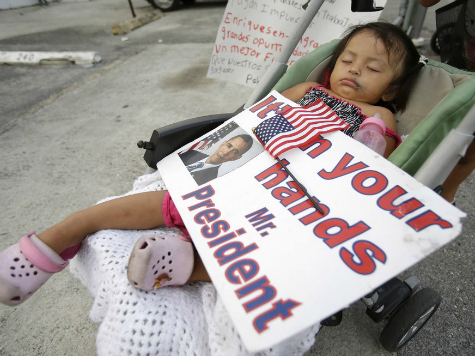President Obama’s unilateral action to grant executive amnesty to millions of illegal immigrants in the United States has shed light on a host of failures that are likely to take place with regard to the logistics of processing the applications. The much smaller-scale Deferred Action for Childhood Arrival (DACA) applications (i.e. the “Dream Act,” by fiat) which took place in 2012 as well as the rollout of Healthcare.gov were riddled with problems, and concerns have been raised about the administration’s ability to handle the much larger task which Obama put forth this past week.
The calls to action have also shed light on the dysfunction at the heart of the nation’s immigration bureaucracy, which many argue needs major adjusting. United States Citizenship and Immigration Services (USCIS)–which will be of two agencies at the heart of implementing Obama’s executive amnesty–already processes over 4 million petitions a year, according to Politico. Customs Enforcement is the other agency.
Obama’s move to grant temporary amnesty to 5 million illegals in the U.S. already would more than double the number of applications in a very short period of time ,creating room for errors. Workers processing the applications will likely skip corners for expediency–as was done with previous acts under the administration — raising the risk for application fraud, among other problems, to take place.
House Judiciary Committee Chairman Robert Goodlatte (R-VA) said Friday that under the 2012 DACA act, the “U.S. Citizenship and Immigration Services publicly touts online that officials do not regularly verify the validity of the documentary evidence provided by applicants to meet the program’s requirements, thereby encouraging fraud,” Politico notes.
The White House, however, seems to keep claiming they have learned from the mistakes they experienced with DACA.
Some of the problems experienced with the DACA act were the unfair punishment of legal immigrants who actually played by the rules of the land by creating longer wait times for their applications to be processed. Essentially, the interests of illegals would be placed ahead of those who are legally in the states awaiting permanent status.
Goodlatte noted that the sheer number of unlawful immigrants involved in Obama’s new plan will only further exasperate these problems.
Additionally, other types of immigration applications will again be delayed, such as legalized U.S. citizens seeking green cards for their relatives, which was delayed by 15 months due to the reallocation of personnel to handle the deferred action plan, notes Politico.
The issue now will be whether or not the administration, specifically President Obama, will be able to deliver on their words. A former federal immigration official, who wished to remain anonymous and who was involved with the planning of the 2012 DACA program, said of Obama’s current immigration order: “There will be a lot of pressure on the administration to ensure that people start seeing visible, tangible results of this announcement quickly–so that it feels real.”

COMMENTS
Please let us know if you're having issues with commenting.